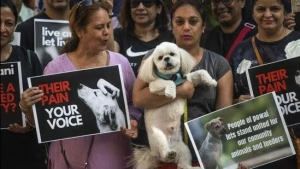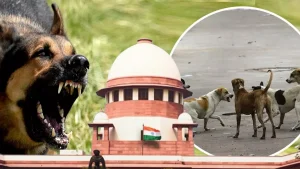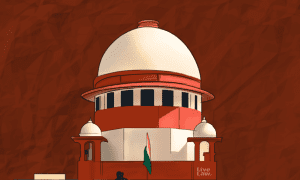New Delhi – The Supreme Court of India has constituted a three-judge bench to address the controversial stray dog matter, with the Delhi Dogs Case Hearing Again scheduled for Thursday, August 14. This development follows intense public backlash against the initial two-judge bench order that mandated the blanket removal of all stray dogs from Delhi-NCR within eight weeks.
The decision to reconstitute the bench demonstrates the court’s recognition of the gravity and complexity surrounding the Delhi Dogs Case Hearing Again. Chief Justice BR Gavai acknowledged the urgency of the matter when it was mentioned before him in open court, responding with assurance that he would “look into it,” leading to the immediate formation of the larger bench.
Initial Controversial Order Triggers Nationwide Debate

On August 11, a two-judge bench issued a comprehensive order directing authorities to remove and relocate all stray dogs to shelters, citing concerns over rabies transmission and increasing dog bite incidents in the capital region. The original ruling set the next hearing for four weeks later, but the overwhelming public response necessitated the Delhi Dogs Case Hearing Again before an expanded judicial panel.
The new bench comprising Justices Vikram Nath, Sandeep Mehta, and NV Anjaria will now oversee the Delhi Dogs Case Hearing Again, bringing additional judicial perspectives to this sensitive matter. The reconstitution reflects the court’s commitment to ensuring thorough deliberation on issues affecting both public safety and animal welfare.
Details of the Original Removal Order


The initial two-judge bench’s directive required authorities to commence capturing stray dogs immediately, beginning with 5,000 animals within the specified six to eight-week timeframe. The comprehensive order emphasized that under no circumstances should these dogs be released back onto the streets after capture, marking a significant departure from traditional animal control approaches.
According to the detailed order published on the Supreme Court website, the captured animals must undergo sterilization, deworming, and immunization procedures as mandated by the Animal Birth Control Rules, 2023. This systematic approach formed the foundation of the original ruling that prompted the Delhi Dogs Case Hearing Again due to widespread concerns about implementation feasibility and animal welfare implications.
Political Leaders Express Strong Opposition


The announcement of the Delhi Dogs Case Hearing Again came after prominent political figures voiced strong objections to the blanket removal strategy. Four members of the Gandhi family, including Rahul Gandhi, Priyanka Gandhi Vadra, Varun Gandhi, and renowned animal rights activist Maneka Gandhi, collectively expressed their concerns about the order’s implications.
Lok Sabha Leader of Opposition Rahul Gandhi articulated his opposition through social media, stating that blanket removals represent cruel and shortsighted policies that strip society of compassion. His statement emphasized that stray animals should not be viewed as problems requiring erasure, advocating instead for comprehensive solutions including shelters, sterilization, vaccination, and community care programs that ensure public safety without compromising animal welfare.
The political response significantly influenced the court’s decision to schedule the Delhi Dogs Case Hearing Again, recognizing the need for broader consultation and consideration of alternative approaches to address the stray dog issue effectively.
Animal Rights Activists and Public Protests
The Delhi Dogs Case Hearing Again became necessary partly due to immediate public demonstrations following the original order. Several dog lovers, animal rights activists, and concerned citizens were detained near India Gate while protesting against the removal directive on the same night it was announced.
People for the Ethical Treatment of Animals (PETA) India strongly criticized the original order, characterizing it as “impractical, illogical, and illegal.” Their opposition highlighted the scientific consensus supporting long-term sterilization and vaccination programs over mass removal strategies, contributing to the momentum that led to the Delhi Dogs Case Hearing Again.
The protests demonstrated widespread public sentiment favoring humane animal management approaches over blanket removal policies, emphasizing the importance of balancing public safety concerns with ethical treatment of stray animals.
Scientific Alternatives and Expert Recommendations
Animal welfare experts and veterinary professionals have advocated for evidence-based approaches during the lead-up to the Delhi Dogs Case Hearing Again. They argue that sustainable solutions require comprehensive sterilization programs, regular vaccination drives, and community engagement initiatives rather than mass relocation efforts.
These scientific recommendations emphasize that effective stray dog population management involves addressing root causes through systematic sterilization and vaccination programs, combined with public education about responsible pet ownership and coexistence strategies.
Implications for Future Animal Welfare Policy
The Delhi Dogs Case Hearing Again represents a crucial moment for establishing precedents in animal welfare jurisprudence. The expanded bench’s deliberations will likely influence how courts balance public safety concerns with animal rights considerations in future cases.
The outcome of the Delhi Dogs Case Hearing Again may establish guidelines for humane animal management practices nationwide, potentially affecting similar issues in other metropolitan areas facing comparable challenges with stray animal populations.
Conclusion: Awaiting Judicial Resolution


As the Delhi Dogs Case Hearing Again approaches, stakeholders across India await the Supreme Court’s reconsideration of this complex issue. The larger bench formation demonstrates judicial commitment to thorough examination of policies affecting millions of stray animals while addressing legitimate public safety concerns through balanced, sustainable solutions.

